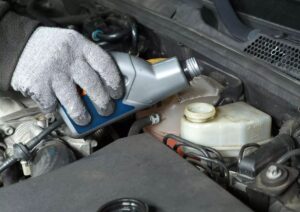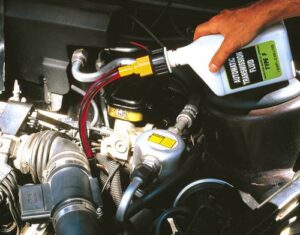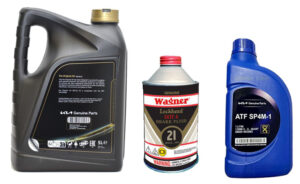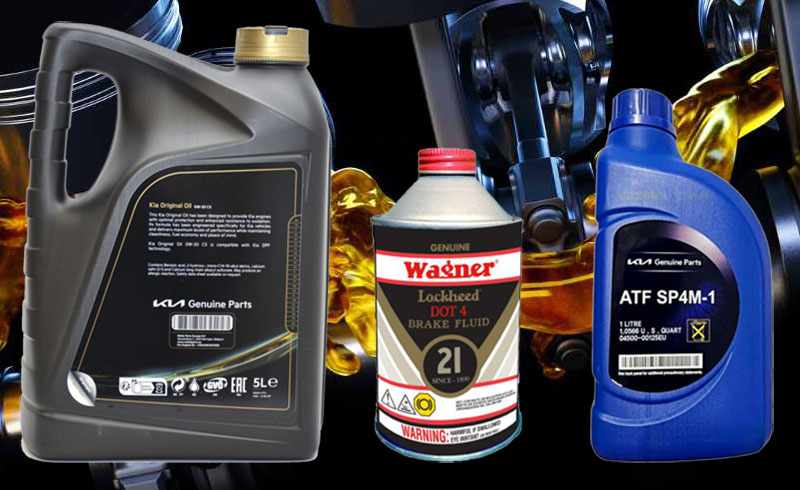If you own a car, you already know that oil plays a crucial role in keeping your vehicle running smoothly. But did you know that not all oils are the same? Three of the most essential types of automotive oils are brake oil, engine oil, and gear oil—each serving a unique purpose.
In this guide, we’ll break down the key differences between these oils, their functions, and why using the right one is essential for your vehicle’s performance.
What is Engine Oil & Why Does It Matter?
Engine oil is the lifeblood of your car’s engine. It lubricates the internal components, reducing friction and preventing wear and tear. Additionally, it helps in cooling the engine, minimizing corrosion, and keeping deposits from forming.
Types of Engine Oil:
- Mineral Oil – Basic and affordable, best for older engines.
- Synthetic Oil – High-performance and long-lasting, ideal for modern engines.
- Semi-Synthetic Oil – A mix of both, offering a balance between performance and affordability.
When to Change Your Engine Oil?
 Regular maintenance is key! Experts recommend changing your engine oil every 5,000 to 10,000 kilometers, depending on your car model and driving conditions. If you want professional oil change services, you can easily book an online service appointment for your convenience.
Regular maintenance is key! Experts recommend changing your engine oil every 5,000 to 10,000 kilometers, depending on your car model and driving conditions. If you want professional oil change services, you can easily book an online service appointment for your convenience.
Brake Oil – The Safety Essential
Your car’s braking system relies on brake oil (also known as brake fluid) to function effectively. Unlike engine oil, which lubricates, brake oil transmits force from your foot on the brake pedal to the braking mechanism, ensuring a smooth stop.
Why Brake Oil is Important:
- Maintains proper braking performance.
- Prevents brake failure due to overheating.
- Protects against moisture contamination that can lead to corrosion.
When to Change Your Brake Oil?
 Brake oil should be replaced every 2 years or 40,000 kilometers. Over time, moisture buildup can reduce its effectiveness, compromising your braking system. Make sure to check your brake oil levels regularly to ensure safety on the road!
Brake oil should be replaced every 2 years or 40,000 kilometers. Over time, moisture buildup can reduce its effectiveness, compromising your braking system. Make sure to check your brake oil levels regularly to ensure safety on the road!
Gear Oil – Protecting Your Transmission System
Your car’s transmission system relies on gear oil to keep the gears shifting smoothly. This specialized lubricant is designed to handle high-pressure conditions and prevent wear inside manual transmissions and differentials.
Why Gear Oil is Essential?
Reduces Friction & Wear – Keeps the transmission components running smoothly.
Prevents Overheating – Protects against excessive heat generated by moving gears.
Enhances Gear Life – Ensures smooth shifting and longevity.
When to Change Your Gear Oil?
 Most cars require a gear oil change every 50,000 to 100,000 kilometers, depending on driving conditions and transmission type. If you notice difficulty shifting gears, excessive noise, or a burning smell, it might be time for a replacement!
Most cars require a gear oil change every 50,000 to 100,000 kilometers, depending on driving conditions and transmission type. If you notice difficulty shifting gears, excessive noise, or a burning smell, it might be time for a replacement!
How to Choose the Right Oil for Your Car?
 Picking the right engine oil, brake oil, and gear oil depends on your vehicle type, driving habits, and manufacturer recommendations. If you’re unsure which oil suits your car best, you can get expert advice by filling out an online inquiry form for professional guidance.
Picking the right engine oil, brake oil, and gear oil depends on your vehicle type, driving habits, and manufacturer recommendations. If you’re unsure which oil suits your car best, you can get expert advice by filling out an online inquiry form for professional guidance.
For additional protection, you might also consider glass coating protection or undercoating protection to extend your vehicle’s lifespan.
Final Thoughts – Keep Your Car Running Smoothly!
Your vehicle depends on the right oil to function efficiently. Whether it’s engine oil, brake oil, or gear oil, regular maintenance and timely replacements will ensure optimal performance and long-term durability.
Need help with your car’s maintenance? Book an online service appointment today for expert assistance!
Stay safe. Drive smart. Maintain your vehicle.













